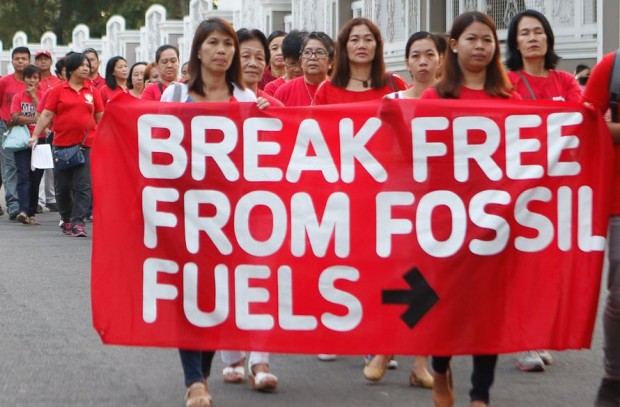
by Deep Green Resistance News Service | Mar 13, 2017 | Strategy & Analysis
This is the seventeenth installment in a multi-part series. Browse the Protective Use of Force index to read more.
via Deep Green Resistance UK
In the next four posts I will assess the environmental movement based on the twelve principles of strategic nonviolent conflict that Peter Ackerman and Christopher Kruegler lay out in their book Strategic Nonviolent Conflict: The Dynamics of People Power in the Twentieth Century. The principles are designed to address the major factors that contribute to the success or failure of nonviolent campaigns. The authors stress that the principles are exploratory rather than definitive. Read more about the principles in the introductory post to this run of posts here.
- Formulate functional objectives
Here we are looking for a clear goal and subordinate objectives. Five criteria help formulate functional objectives. They need to be concrete and specific enough to be achievable within a reasonable time frame. They need to include a diverse range of nonviolent methods. They need to maintain the main interests of the protesters rather than the adversary. They must attract the widest possible support within the relevant society. The objectives need to appeal to the values and interests of external parties to gain their support.
The mainstream environmental movement fails on this principle – formulate functional objectives. It does use a wide range of nonviolent methods, but fails to meet the other four criteria. Most critically, because it’s so large and diverse, it has no clear goal or objectives. I have run a number of workshops on this topic and none of the participants can agree on the goal and objectives of the environmental movement, and get confused between the goals and objectives of the whole movement or specific campaigns. Generally they all want a livable planet in the future and they seem to go about this by trying to convince everyone else that they need to take environmental issues seriously. This slow burn, paradigm shift strategy is not proving effective.
The movement also fails to determine its response based on what needs to happen in the material realm; versus, say, the taking-issues-seriously realm–in light of very pessimistic scientific forecasts–so fails to identify functional and appropriate objectives. Building a mass movement to transition to a sustainable society might have been possible if it had happened in the twentieth century, but we are now out of time and need drastic action to leave the fossil fuels in the ground.
The environmental movement also struggles because nature is currently viewed as property. So those that own parts of nature are legally allowed destroy them, with some minimal limitations. The more nature you own the more nature you can destroy. The environmental movement has been urging a more careful use of that property – environmental regulation. Attorney Thomas Linzey explains that successful movements take property like African American slaves or women before suffrage and convert them from the status of property, to a person or rights-bearing entity. There has never been an environmental movement that has focused on this, and anyone who has suggested it has been labeled radical or crazy. [1]
The environmental movement fails to attract wide support because it is telling people about a problem in the future that will mean they have to change their lives dramatically now. Of course there is also the whole issue of how the culture turn living systems into products to make money, but many don’t seem to notice this. This causes people’s denial reflexes to kick in so many find excuses not to think about it or act: “the science is wrong;” “the government will handle it;” “I recycle so I do my bit;” “they’ll find a technology to sort it out.” And because industrialised countries have such atomised societies with no community, then there is no moral code for anyone to answer to, just the made-up laws from the state.
There is much written about the psychological reasons why people fail to engage and act on climate change and environmental destruction, with seven books recently published on the subject.
The American Psychological Association task force identified six barriers to people acting:
- uncertainty about climate change;
- mistrust of scientists/officials;
- denial;
- undervaluing risks so deal with them later;
- lack of control – individual actions too small to make a difference;
- habit – ingrained behaviours are slow to change.
A recent report from ecoAmerica and the Center for Research on Environmental Decisions (CRED) at Columbia University’s Earth Institute — entitled “Connecting on Climate: A Guide to Effective Climate Change Communication,” identified seven psychological reasons that are stopping us from acting on climate change:
- psychological distance – too far in the future;
- finite pool of worry – people can only worry about a certain amount at once;
- emotional numbing – people get emotionally overloaded;
- confirmation bias and motivated reasoning – people seek out and retain information that matches their world view;
- defaults – people are overly biased in favor of the status quo;
- discounting – people value loss of money far in the future as less important that money now;
- ideology – political beliefs are deeply felt and highly emotional, even though it’s not clear how we come to these conclusions.
The phenomenon that psychologists call the “passive bystander effect” is relevant here. If people feel powerless they will deliberately maintain a level of ignorance so that they can claim that they know less than they do and wait for someone else to act first, to protect themselves.
Another recognised strategy to avoid dealing with climate change is to keep it out of your “norms of attention”. Basically people use selective framing so they don’t have to think about climate change most of the time. Opinion polls find that people define it as either a global issue, or far in the future. Others might say it’s only a theory or blame other countries. The fact that climate change is now seen as an environmental issue also resulted in it being excluded from their primary concerns or “norms of attention.” They can say “I’m not an environmentalist” or “The economy and jobs are more important.”
Without a functional, accurate analysis of a situation, there can be no way to formulate functional objectives to confront it. Because most peoples’ norms of attention are not focused on the actual gravity and immediacy of global warming, any organisation formulating functional objectives only accounts for a small number of actively engaged resisters, and what they can realistically accomplish.
More to follow.
Endnotes
- Thomas Linzey interviews with Derrick Jensen http://resistanceradioprn.podbean.com/e/resistance-radio-thomas-linzey-102013/ and http://prn.fm/resistance-radio-thomas-linzey-06-19-16/
To repost this or other DGR original writings, please contact newsservice@deepgreenresistance.org

by Deep Green Resistance News Service | Mar 10, 2017 | Lobbying
Featured image: The Matsés have denounced oil exploration in the proposed Yavarí Tapiche reserve, which is part of their ancestral lands. © Survival International
by Survival International
In an open letter to the Peruvian authorities, Survival International, Rainforest Foundation Norway and Peruvian indigenous organization ORPIO have denounced the Peruvian government’s failure to protect uncontacted tribes.
The organizations are calling for the government to create an indigenous reserve, known as Yavari-Tapiche, for uncontacted tribes along the Peru-Brazil border, and to put a stop to outsiders entering the territory.
In the letter the three organizations state: “Uncontacted tribes are the most vulnerable peoples on the planet. They have made the decision to be isolated and this must be respected…
“The Yavarí Tapiche region is home to uncontacted peoples. Despite knowing of their existence and enormous vulnerability, the government has failed to guarantee their protection…
“These tribal peoples face catastrophe unless their land is protected. Only by creating the proposed Yavarí Tapiche indigenous reserve and implementing effective protection mechanisms that prevent the entry of outsiders, will the indigenous people be given the chance to determine their own futures…
“We are also concerned about the government’s refusal to exclude oil exploration within the proposed reserve…. No exploration or exploitation of oil should ever be carried out on territories inhabited by uncontacted Indians…
“We believe that the oil company Pacific Stratus is poised to begin operations this year in areas where there are uncontacted tribes…
“By failing to both create the reserve and to rule out oil exploration, Peru is violating both domestic and international law…
“If the government does not act urgently to protect the uncontacted peoples of Yavarí Tapiche, we fear that they will not survive. Another tribe will disappear from the face of the earth, before the eyes of the world.”
Survival’s Director Stephen Corry said: “We’ve repeatedly called for the Yavarí-Tapiche indigenous reserve to be created and for oil exploration to be ruled out, but the government has dragged its feet. The lives of uncontacted Indians are on the line but once again, economic interests take priority.”
Background Briefing
– The Yavarí Tapiche region is part of the Amazon Uncontacted Frontier. This area straddles the borders of Peru and Brazil and is home to more uncontacted tribes than anywhere else in the world.
– Pacific Stratus, part of Canadian oil company Pacific E&P, began its first phase of oil exploration in 2012, despite protests from indigenous organizations and Survival International. It is believed that the company will begin its second phase soon.
– Oil exploration is devastating for uncontacted tribes. Over 50% of the Nahua tribe died as a result of exploration in the 80s.
– The indigenous organization ORPIO is suing the government over the threat of oil exploration.
– National indigenous organization AIDESEP has been calling for the creation of the reserve for over 14 years.
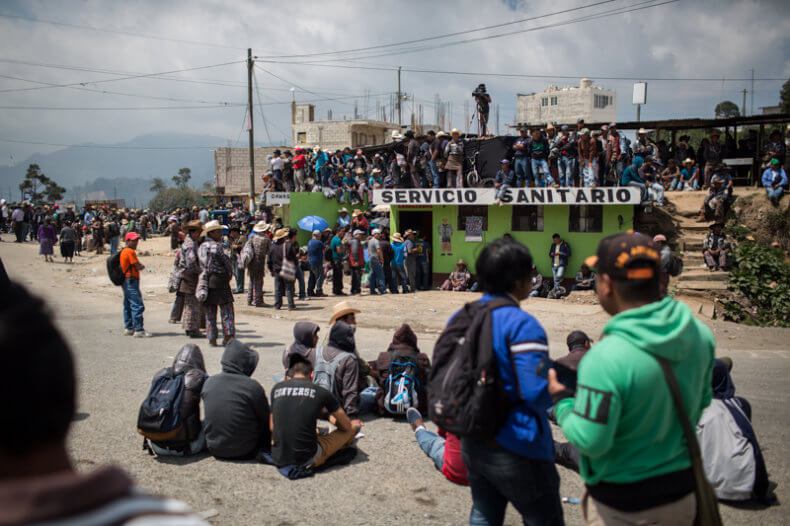
by Deep Green Resistance News Service | Feb 26, 2017 | Indigenous Autonomy, Obstruction & Occupation
Featured image: Protesters gathered at Los Encuentros, by Anna Watts
by Anna Watts / Intercontinental Cry
Indigenous communities across Guatemala have brought the country to a standstill for the second day in a row. Blockading major crossroads and highways, the nationwide peaceful demonstrations are protesting against the Guatemalan congress’s rejection of a constitutional reform that would legally recognize indigenous justice as part of the country’s judicial system.
An estimated 60 percent, or more than 6 million inhabitants, make up Guatemala’s population (IWGIA). Yet indigenous systems of justice, wherein local authorities rule on community issues, have been looked down upon by a country that continues to hugely discriminate against its majority indigenous population. The reforms face opposition from conservatives and major businesses that control most of Guatemala’s land and economy. Although many of these business interests campaigned against the reforms under the guise of fearing “legal confusion,” indigenous activists and leaders at the protests describe the opposition as deriving from a fear of losing any of their elite power to those who have been oppressed and exploited for centuries–Indigenous Peoples.
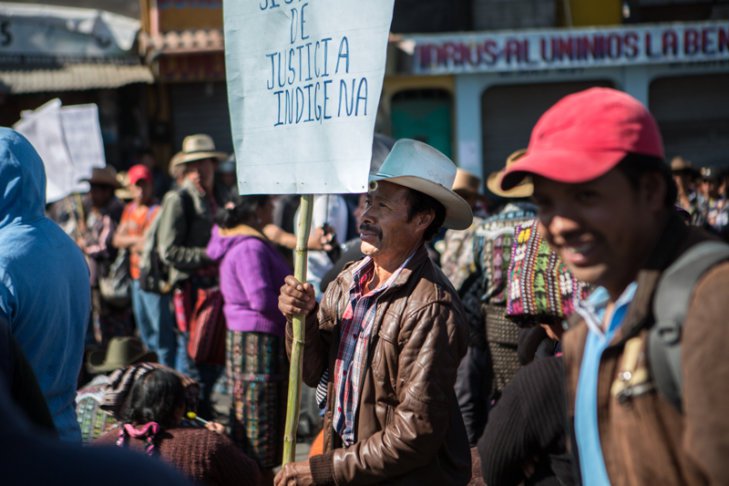
Photo: Anna Watts
At Los Encuentros, one of the most important crossroads between major cities located along the Pan-American Highway, thousands of indigenous people of the Sololá region gathered to participate in the blockades. Carrying handmade signs and led by their respective indigenous leaders, community groups unloaded from packed cargo trucks and chicken buses, carrying ready-made lunches to last through a full day of protesting.
By 8:30 AM, every tienda, comedor, and tortilla stand had been closed down and locked up, a rare sight for the ever-bustling highway hub. The majority indigenous city of Sololá was deserted; not a car in sight nor shop windows open. Pick-up trucks and makeshift blockades of boulders and large tree branches cut off traffic between smaller communities surrounding Lake Atitlán.
Protesters organized and coordinated solely by means of meetings and phone calls between indigenous community leaders. Use of Internet or social media to communicate and gain protest support was entirely avoided out of fear of vulnerability and tracking by police and those opposing the reforms. This distrust was reflected in weak media coverage of the protests; in spite of the thousand plus standing in solidarity at Los Encuentros, only one reporter from a local agency showed up with a small video camera.
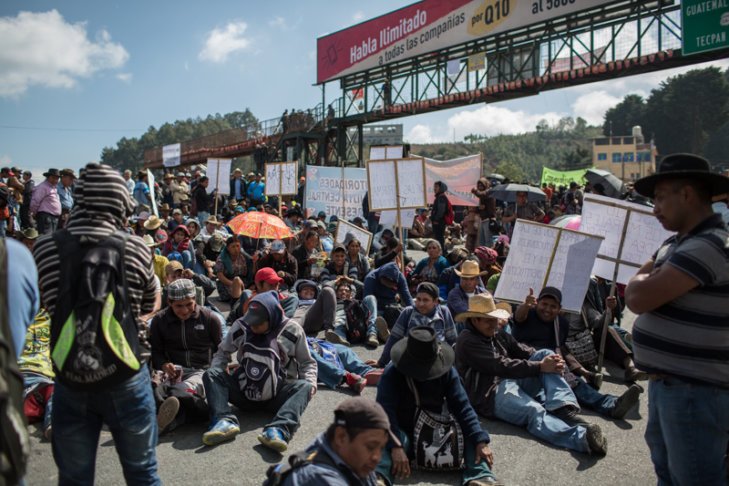
Photo: Anna Watts
by Deep Green Resistance News Service | Feb 21, 2017 | Strategy & Analysis
This is the sixteenth installment in a multi-part series. Browse the Protective Use of Force index to read more.
via Deep Green Resistance UK
The environmental movement is up against a near-impossible task. It is also suffering from being co-opted by capitalism, so it is now more about sustaining human civilisation at the comfort level that those in industrialized countries expect and trying to minimise the impact on nature. In the US, the 10 organizations leading the environmental movement collectively have 15 million members and an annual budget of more than $525 million. Unfortunately the strategies of most big green organisations involve collaborating, compromising and greenwashing industry and have no chance of stopping the destruction of our world.
Recent books on the environment movement paint an optimistic picture. Naomi Klein’s This Changes Everything was disappointingly reformist after her excellent Shock Doctrine. Klein seems to have a blind faith that environmental issues will be solved by mass movements and renewables. [1] People in the environmental movement generally look at the good things happening [2] rather than going to the root of the issues and determining what needs to happen. It’s important to say that I know I am part of the environmental movement that is not being effective, so I’m directing this criticism at myself as well.
If we look at the Taxonomy of Action from the DGR book, it’s clear that the environmental movement has focused mostly on political, social, and economic non-cooperation, education, symbolic lobbying and protesting, education and raising awareness. There is very little confronting and dismantling power, which is essential since those with power will never give it up voluntarily.
The climate movement has mainly focused on raising the awareness of environmental issues and climate change, and failed to sufficiently escalate its tactics in line with the threat. [3] The movement has used a substantial amount of nonviolent direct actions, but very few are willing to put their bodies on the line. The movement has failed to seriously damage profits through boycotts and bans. [4] The movement has also failed to get adequate popular support.
Radical environmental activists’ tactics have evolved to make blockading more physically effective but this is still based on the premise of slowing industry, rather than stopping them. These new tactics include tripods, monopoles, cantilevers, and tree-sits; lock-ons, burials, dragons (dig a hole and bury protesters up to their neck to slow removal), pipes, and tunnels; static blocking methods (e.g., boulders); militant direct actions that may involve risk to humans such as occupying an office and denying entry to the authorities. [5]
Assessing the Mainstream Environmental Movement Based on the Principles of Strategic Nonviolent Conflict
Ackerman and Kruegler lay out twelve principle of strategic nonviolent conflict in their book Strategic Nonviolent Conflict: The Dynamics of People Power in the Twentieth Century. The principles are designed to address the major factors that contribute to the success or failure of nonviolent campaigns. The authors stress that the principles are exploratory rather than definitive.
The twelve principles are categorised into three groups:
- Principles of development focuses on how to create the most advantageous environment,
- Principles of engagement looks at how to interact with the opponents so nonviolent methods have the maximum effect,
- Principles of conception looks at what strategic options remain and assesses the success of the campaign.
You can read a brief summary of the principles, or the full chapter.
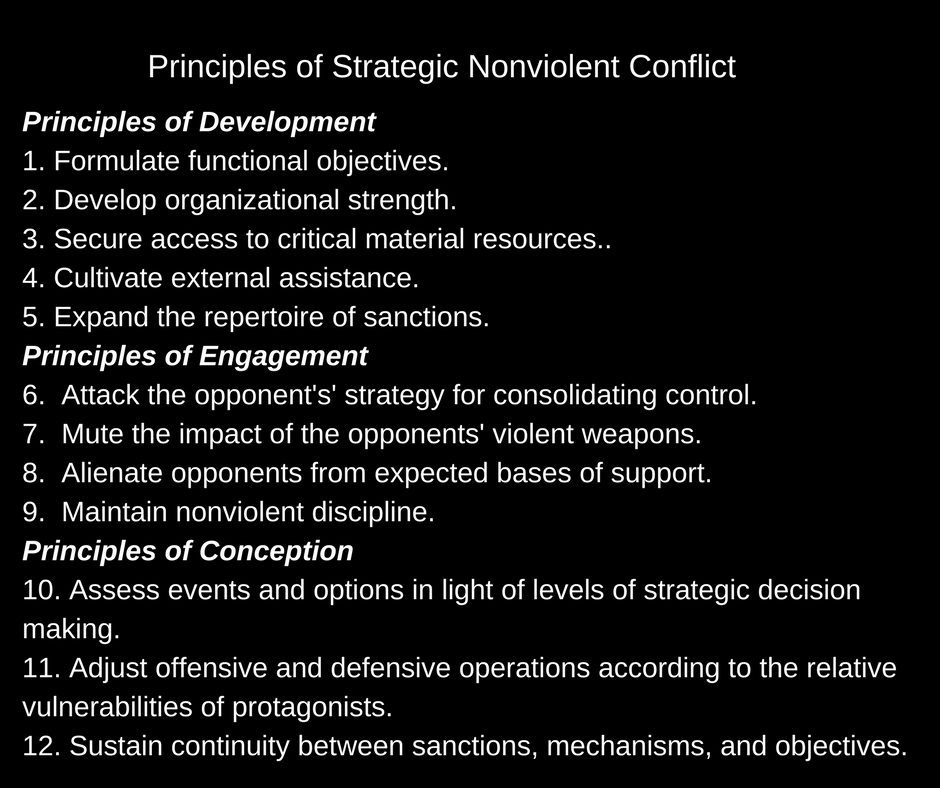
The mainstream environmental movement is mostly committed to using nonviolent methods. In future posts I will assess the environmental movement based on the principles identified by Ackerman and Kruegler. How does the mainstream environmental movement measure up?
This is the sixteenth installment in a multi-part series. Browse the Protective Use of Force index to read more.
Endnotes
- Read a review of This Changes Everything by Kim Hill from DGR Australia.
- Positive things environmentalists focus on: renewables; reduction in endangered species smuggling; tree planting and forest protection; growth of ethical businesses; the Transition Town movement; ‘Reclaim the Streets’ parties and ‘Critical Mass’ bike rallies; sustainable paper use; organic food; guerilla gardening; squatting; learning sustainability from experts; more empowered women; Schumacher’s ideas around “small is beautiful” local economies; and alternative political systems
- Counterpower: Making Change Happen, Tim Gee, 2011, page 99
- Counterpower, page 184/5
- Global Warming, Militarism and Nonviolence: The Art of Active Resistance Hardcover, Marty Branagan, 2013, page 114-122
To repost this or other DGR original writings, please contact newsservice@deepgreenresistance.org

by Deep Green Resistance News Service | Feb 19, 2017 | Education, Movement Building & Support
by Erin Moberg / Deep Green Resistance Eugene
On Saturday, February 4th, several members of DGR Oregon attended a day-long NVDA training in Eugene, Oregon. The event was organized by local and regional activists. Over 200 people attended, including local activists, community members new to direct action, college students, youth, retired people, and others from nearby towns.
DGR members attended this training as part of an increased effort to connect with Eugenians from other activist groups and to invite community members to two upcoming events: (1) a DGR Open House in downtown Eugene (March 8) and (2) an Advanced Direct Action Training to be held just outside of Eugene over Earth Day weekend (April 22-23). We also, of course, wanted to see what we could learn.
The Keynote Speaker was Leonard Higgins, who shared a short film documenting his experience as one of the “valve turners” who shut down oil pipelines in five states in October of 2016. Higgins described direct action as “not the only important work to be done” but crucial in that it supports other activist work, including: changing the economy, transitioning to alternative energies, and expanding community organizing strategies. Although his remarks and the entire training focused on “preserving life as we know it and civilization” and “ensur[ing] a future for human civilization,” Higgins and the film did help to normalize and demystify direct action for those new to environmental activism.
People who want to support the valve turners can attend a legal costs fundraiser event on the evening of February 24th at 6:30pm at the First Methodist Church near downtown Eugene. The suggested donation for the event is $20, but no one will be turned away for lack of funds.
The workshops (Medic Training, Encryption Basics, Jail/Arrest Support, Action Planning, “Artivism,” and more) emphasized peaceful resistance toward the end of sustaining or bettering life for human beings. Even when referencing the Water Protectors at Standing Rock, there was no concrete mention of the destruction of the land and little reference to the occupation of indigenous communities and territories by the culture of empire. While this may be simple omission, it’s a trend in mainstream activist groups—especially in predominantly white groups—to avoid naming the problem, and to avoid being “negative.”
Most frustrating in the workshops was the lack of organization and structure; many facilitators had poor presentational skills, little understanding of key semantic nuances of relevant terminology (ie: violence, use of protective force, and violation), and an overall lack of consciousness around anti-oppression strategies necessary to foster equitable engagement and collaborative environments.
This is unsurprising, as in our experience mainstream activist groups and NGOs such as this often serve as a sort of buffer against truly revolutionary change by funneling energy, donations, and volunteers into minor reforms.
In the workshop on Action Planning, the facilitator (a Portland-based activist) did share several strategies that could be useful for DGR meetings, direct action trainings, and forum culture. One is the acronym WAIT/WAINT (Why Am I Talking? / Why Am I Not Talking?), a variant of the Step Up/Step Back framework designed to encourage those who occupy positions of privilege and tend to dominate (white people, men, documented folks, etc.) to hold space for those whose voices and experiences are often silenced or ignored (people of color, women, undocumented folks, etc.). She also explained the “Points of Intervention Model” as way for activists to identify how, where, and when to plan a concrete direct action. This model asks organizers to consider points of production (ie: labor site), destruction (ie: mines), consumption (ie: households), decision (ie: corporate head), assumption (ie: segregated spaces), and potential before then deciding on:
- vision –> (2) campaign–> (3) strategy–> (4) tactic–> (5) action
Her example was:
- Stop climate change–> (2) Halt proposed pipeline construction–> (3) pass anti-pipeline legislation–> (4) forums, petitions, lawsuits–> (5) Not specified during the workshop
While the training was a good first step for first-time activists interested in learning more about political organizing, this day of workshops didn’t provide a compelling vision of the application of political power. For those with little to no activist experience, there were no clear articulations of the history, potential, and goals of direct action. For those who attended as experienced activists, there were no hands-on workshops offered for specific direct action skills trainings (ie: how to build and use lockboxes). The legal presentations, encryption info, and medic training did offer concrete skills that are valuable to organizers. In terms of community representation at this event, there were no facilitators of color, few female facilitators, and few opportunities designed to connect training participants one-on-one.
Overall, this training focused on issues leading up to or arising in the aftermath of direct actions, not the actions themselves. For organizing large groups to achieve reforms, it was a potentially useful training. However, for people interested in deep revolutionary changes, it was lacking.
Thanks to the organizers for hosting this event.
People interested in learning more advanced skills should contact DGR Eugene to inquire about our advanced direct action training scheduled for Earth Day weekend, April 22-23.
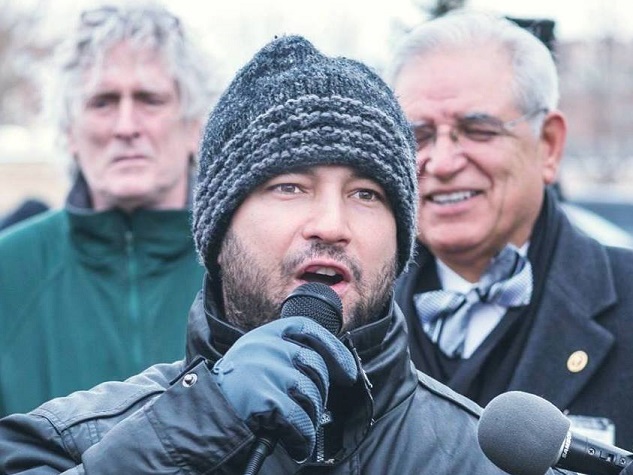
by Deep Green Resistance News Service | Feb 17, 2017 | Movement Building & Support, Strategy & Analysis
by Vincent Emanuele / Z Communications
Tonight, I attended a town hall meeting featuring John Zody, the utterly uninspiring and banal Chairman of the Indiana Democratic Party. The meeting was as informative and inspiring as it was frustrating and sad. Without doubt, the Indiana Democratic Party is in serious trouble. In a county that’s 48% people of color, less than five of the 65 folks in attendance were black or brown.
Honestly, I actually feel bad for the party and its die-hard supporters. That’s no bullshit. They’re so fractured and disorganized it’s almost unbelievable. For instance, the so-called leaders of the Lake County Democrats were too busy drinking Budweisers at the VFW bar to even pay attention to what most of their constituents were saying. That’s the level of respect the Democratic Party gives its people.
Mark Lopez, the top aide for Rep. Pete Visclosky (D-IN), spent the night walking around the room, making sly remarks under his breath, and shaking hands with the local drunks and criminals who operate the party at the county level. If you don’t know the history of the Democratic Party in Chicago or Lake County, Indiana, please, do some research.
At this point, I’m convinced that anyone who thinks they’re going to reform the Democratic Party is not only wrong, they are completely out of touch with reality. The Democratic Party resembles a walking zombie that doesn’t even realize it’s dead yet. That’s how bad tonight was, at least in terms of what people should expect for the future of the Indiana Democratic Party.
However, and this is a very important distinction, the people who attended tonight’s meeting, particularly the women in the room, had very interesting things to say about organization, values, vision and the future. They want a serious platform and they’re willing to work for it. They made tonight’s meeting worthwhile and interesting.
That being said, my frustration with the Left is limitless. To be clear, if the Left had its shit together, it could control entire swaths of this country, including places like Northwest Indiana. The people are ready. They want to organize. You know what I heard people say throughout tonight’s event? “How can we organize? How do we create grassroots organizations? Where are the tools and resources?”
In other words, the things that people were asking of Zody and the Democratic Party – resources, vision, money, manpower – should be provided by the Left. Those things will not come from traditional unions. In fact, as time moves along, I have less and less faith that organized labor will do a damn thing for the people of Indiana. After all, in 1962, Indiana was the third most unionized state in the country. Today, those unions are in shambles.
In many ways, unfortunately, they are part of the problem. The unions who operate in Indiana do not educate or organize their members, yet they badger those who voted for Trump. That’s not a winning strategy. I heard several people tonight talk about ignorant “hillbillies” and union members who “don’t get it.” In the meantime, instead of organizing their members and helping local community groups, unions in the Hoosier state wasted millions of dollars trying to elect centrist Democrats like Evan Bayh and John Gregg.
Undoubtedly, we need new institutions and we need to build them now. That’s the sort of work that gets me excited. And yet, I’m willing to work with local progressive Dems, for strategic reasons, but on our terms, not theirs. There is, for lack of a better term, a power vacuum in Northwest Indiana.
The Republican Party sure isn’t going to fill it. Black and brown people in the sate of Indiana aren’t going to all the sudden turn conservative. And after tonight, I’m more than convinced that the Democratic Party isn’t going to fill the gap. So, who, or what, will? That’s the question activists and organizers must answer, and soon.
Yes, right now, we have plenty of people in the streets. But these actions remind me of 2006-2008, when people were overwhelmingly opposed to the Bush regime. Yes, we were anti-Bush, but we never created alternatives to the Democrats or the major NGOs, many of whom continue to influence and/or control the major demonstrations taking place against Trump.
In many ways, I liken the Left’s current dilemma to someone thinking about getting back into good physical shape. You don’t go to the gym and expect to bench press 300lbs without years of laying a solid foundation. You don’t go to jiu jitsu practice expecting to successfully grapple black belts in your first couple years. These things take time.
We need to build a solid foundation and that becomes very difficult if we’re beholden to news cycles. My advice: stop watching the news. Stop paying attention to the day-to-day madness of the Trump regime. Sit back, read, think, reflect and learn. That’s the only way we’ll stop making the same mistakes we’ve made for decades.
People want to act, and that’s great. But if those actions aren’t tied to something larger, more substantive, they’ll be fruitless in the long-term. I fully understand everyone’s sense of urgency, but I’m starting to think that level of anxiety is extremely unhealthy and rather unproductive.
We need activists to operate with less emotions and urgency, and with more focus, which requires discipline, education and time. We don’t have time, but we can engender discipline and a radical political education.
Vincent Emanuele is a writer, journalist and activist who lives in Michigan City, Indiana. He hosts “Meditations and Molotovs” which airs every Monday @1:00pm(CST) on the Progressive Radio Network (prn.fm) and can be reached at vincent.emanuele333@gmail.com








